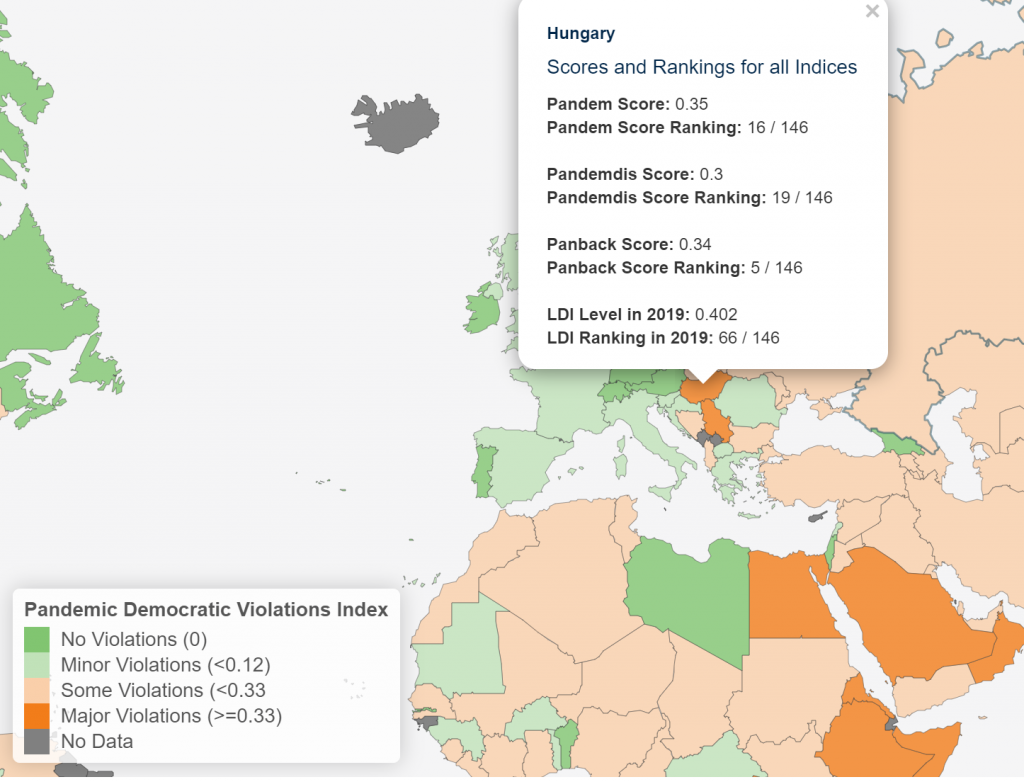In recent years, Hungary has been slowly reverting back into its old authoritarian ways. The COVID-19 pandemic has only exacerbated the process.

Before the World-Wide Shutdown
The fall from grace all started in 2010 when Viktor Orban took office as prime minister. His policies are rooted in old-fashioned Christian teachings, twisted to fit a narrative of hyper-nationalism, that somehow justify his new immigration orders. His party, the Fidesz Party, proved to be a positive change from authoritarianism in its early days when it promoted a free market economy and tax cuts. Orban has now abused his power immensely by capitalizing on Hungary’s collapsing economy. His party gained a vast majority in the legislature and opposition parties have little to no say in how to handle the virus. Now in his third consecutive term, Orban’s far-right rhetoric is bringing the country closer to becoming an illiberal democracy, destroying the liberal values the country worked so hard to establish.
Democratic Ranking & Why Hungary Scored So Badly
Freedom House is an organization that gives an in-depth look at democracy in countries around the world and analyzes just how “free” they are. They also research a variety of core issues related to democracy and advocate for the free flow of information and ideas. In the case of Hungary, the country was ranked as “partly free,” given their current status of limited political rights and denied civil liberties. According to the index, there are many key developments that fully explain why Hungary is experiencing a democratic backsliding. The development that is the most striking states that “opposition parliamentarians and journalists lost much of their ability to oppose the criticism of the government.” A law that previously granted journalists and local politicians all-day access to the public buildings was repealed last year, leading to the disruption of the flow of relevant and critical information.
Rule by Law? Nope. Rule by Decree!
Soon after the first confirmed case of COVID-19 in the country, the Hungarian parliament passed a new set of Coronavirus measures that allowed Prime Minister Orban to rule by decree, a method seldom encompassed by minimalist and maximalist definitions of democracy. Schools, stores, and restaurants were closed, and people were ordered to stay inside. The bill ensures Orban has unprecedented emergency powers that have no limit on time or actions during the state of emergency. Some of the new precautions include a jail sentence “for spreading misinformation that hinders the government response to the pandemic“. Another measure included in the bill ensures that during the state of emergency, no elections shall be held. Orban could without a doubt extend his emergency powers to the next election cycle and inevitably lengthen his term to seize ultimate control. Free and fair elections are necessary for the stability of a democratic state (Rose 2019, 12-13). World-renowned political scientist and democratization theorist, Larry Diamond, explains that free elections occur when the “barriers to entry…are low [and] when there is substantial freedom for candidates and supporters of different parties to campaign and solicit votes” (Diamond 28). With the lockdowns continued, new candidates would be unable to effectively campaign and gain footing in the next election. It seems like the administrative consensus on how to properly keep people safe during a global pandemic revolves around the ordered silence of opponents and the canceling of critics.
Democratic Backsliding

This chart is constructed by V-Dem, an organization of social scientists that focus on measuring democracy through multidimensional datasets. They have provided another score much like Freedom House does, but this directly relates to the Covid-19 pandemic. As we can see, Hungary is in the red for having major violations of components to democracy. There is a level three violation on the imposed restrictions of media freedom, including the verbal harassment of journalists and increased censorship efforts by the government. Yet another example of how Prime Minister Orban is abusing his emergency powers and gravely harming his country. Author Nancy Bermeo goes into lengthy detail about a concept known as democratic backsliding in her article from the Journal of Democracy: On Democratic Backsliding. She highlights that “democratic backsliding can thus constitute democratic breakdown or simply the serious weakening of existing democratic institutions for undefined ends” (Bermeo 2016). In the Eastern bloc, it is not uncommon for each of the countries to be less developed, economically speaking, compared to the Western democracies. Major hubs of commerce like Budapest could not boost the economy as usual because of the halt on tourism and the stay at home order. The more time that major cities spend in this lockdown limbo, the weaker the economy will get. Given the already “poorly equipped healthcare systems,” Hungary is in a difficult position to effectively fund measures that will eradicate the virus.
An indefinite and uncontrollable state of emergency gives way for checks and balances to be thrown out the window and civil rights to be severely curtailed. Instead of having the best interests of the Hungarian citizens in mind, Orban took the pandemic as an opportunity to bolster his authority and “infringe on liberal and democratic rights”. In the coming months with coronavirus restrictions slowly lifting, Hungary and other countries deeply affected by the pandemic will either see a bright future of freedom and democracy, or it will face a new era of authoritarianism and power-hungry politicians.
Hannah DiLiberto is a senior at SUNY Geneseo, majoring in Political Science with a minor in Communications.
Bibliography:
Ablonczy, Balint. “Life in Hungary during COVID-19.” Atlantic Council, April 17, 2020. https://www.atlanticcouncil.org/blogs/new-atlanticist/life-in-hungary-during-covid-19/.
Bermeo, Nancy. 2016. “On Democratic Backsliding.” Journal of Democracy.
Dempsey, Judy. “Orbán Exploits Coronavirus Pandemic to Destroy Hungary’s Democracy.” Carnegie Europe, March 31, 2020. https://carnegieeurope.eu/strategiceurope/81410.
Diamond, Larry Jay. “Thinking About Hybrid Regimes.” Journal of Democracy, vol. 13, no. 2, 2002, pp. 27-28.
Landwehr, Claudia, and Armin Schafer. “Populist, Technocratic, and Authoritarian Responses to Covid-19,” July 23, 2020. https://items.ssrc.org/covid-19-and-the-social-sciences/democracy-and-pandemics/populist-technocratic-and-authoritarian-responses-to-covid-19/.
Rose, Richard. 2019. “Democratic and Undemocratic States.” Democratization 12-13.
Walker, Shaun, and Jennifer Rankin. “Hungary Passes Law That Will Let Orbán Rule by Decree.” The Guardian. Guardian News and Media, March 30, 2020. https://www.theguardian.com/world/2020/mar/30/hungary-jail-for-coronavirus-misinformation-viktor-orban.
Walker, Shaun. “Orbán Deploys Christianity with a Twist to Tighten Grip in Hungary.” The Guardian. Guardian News and Media, July 14, 2019. https://www.theguardian.com/world/2019/jul/14/viktor-orban-budapest-hungary-christianity-with-a-twist.
